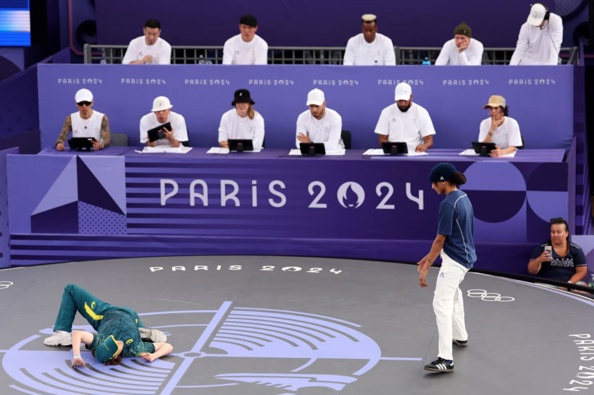Follow
the podcast on

Australian political leaders have leapt to the defence of Rachael Gunn as the Olympic team closes ranks behind the under fire breakdancer.
The 36-year-old, known as Raygun, failed to score a point when breaking made its debut as an Olympic sport in Paris on Friday.
Vision of the Macquarie University lecturer’s performance sent social media into a spin and raised questions about the sport’s validity.
Back home, Prime Minister Anthony Albanese commended Gunn when asked about criticism of her routine.
“Raygun had a crack, good on her, and a big shout out to her,” he told reporters in Adelaide on Sunday.
“That is in the Australian tradition of people having a go. She’s had a go representing our country, and that’s a good thing.
“Whether they’ve won gold medals or just done their best, that’s all we asked for. It’s the participating that is really important.”
Breakdancing has been dropped from the programme for the 2028 Los Angeles Olympics, with no guarantee it will return at Brisbane in 2032 or beyond.
Victorian Premier Jacinta Allan said she had enjoyed watching the sport and suggested Raygun was a champion already as someone chosen to represent their nation on the world stage.
“To quote Taylor (Swift), let the haters hate and let’s just get on celebrate our Olympians’ success,” she said in Melbourne.
Chef de mission Anna Meares was similarly supportive of Gunn, condemning comments from “trolls and keyboard warriors”.
“I love her character and I feel very disappointed for her that she has come under the attack that she has,” she said.
Gunn lost all three of her round-robin battles by a combined score of 54-0 and admitted post-event that she couldn’t compete athletically with the tricks and spins of her younger opponents.
“What I wanted to do was come out here and do something new and different and creative - that’s my strength, my creativity,” she said.
Gunn has published a doctoral thesis entitled Deterritorialising Gender in Sydney’s Breakdancing Scene: A B-girl’s Experience of B-boying.
The thesis questioned why so few female participants were part of the male-dominated scene but spoke of the sport as a “space that embraces difference”.
Take your Radio, Podcasts and Music with you









